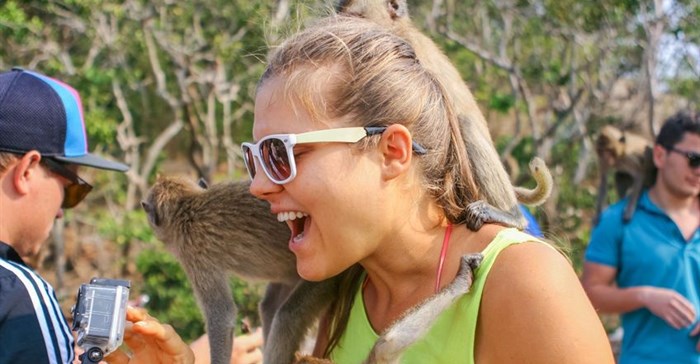BRASILIA, Brazil - The craze for tourists taking selfies alongside wild animals, then posting on Instagram is fueling cruel treatment of iconic species in the Amazon, activists warn.
The charity World Animal Protection said in a report that Instagram has seen a 292 percent increase in wildlife selfies since 2014 around the world. Of these, more than 40 percent involved humans "hugging or inappropriately interacting with a wild animal."
Beaten into submission
World Animal Protection said, in the report released Tuesday, that the animals are captured and often battered to make them perform for tourism businesses.
"Behind the scenes, these animals are often beaten into submission, taken from their mothers as babies and secretly kept in filthy, cramped conditions or repeatedly baited with food that can have a long-term negative impact on their biology and behavior," the group said.
"All too often, to the unsuspecting tourist, the cruelty that makes these animals submissive and available is entirely invisible."
61 species listed as needing protection
The practice is rife in the Amazon region, with 61 percent of the species involved listed as needing international protection by the worldwide Convention on the Trade of Endangered Species, or CITES, according to the charity.
In the Brazilian Amazon city of Manaus, for example, 18 tour companies said they offered opportunities on 94 percent of trips to "hold and touch wild animals as photo props." The most common selfie animal there is the pink river dolphin, then three-toed sloths, caimans, green anacondas and squirrel monkeys. "There is good reason to believe that most sloths being used for tourist selfies don't survive even six months of this treatment," the report said.
It listed examples of animals being kept in dire conditions for the selfie trade, including a manatee held in a small tank in front of a hotel and a giant anteater "manhandled and beaten" by its owner.
Keeping animals for tourist selfies is illegal
Roberto Cabral, coordinator for enforcement at the Brazilian environmental institute Ibama, told AFP that keeping animals for tourist selfies is illegal.
In comparison to the scale of illegal trafficking of animals, the problem is "minimal," he said.
However, he also pleaded with visitors not to support the trend. "The irony is that the tourist who usually takes photos with an animal is the same tourist who likes animals but is now contributing to that animal's distress," he said.
Source: AFP














